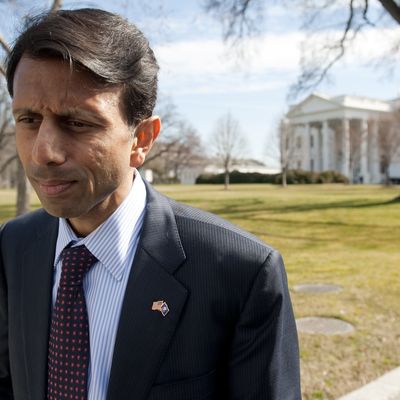
Barack Obama’s method of persuasion involves conceding his opponent’s most justified grievances in order to locate common ground. When Obama does this with Republicans, by acknowledging that government can overreach, he irritates liberals. When he does this in the context of acknowledging American historical failures to other countries whose behavioral improvements he is urging, he angers Republicans, who depict him as an unpatriotic apologist. That vein of resentment has taken on religious overtones, as Obama appeared before a National Prayer Breakfast and, in the service of denouncing Islamic extremism, acknowledged that Christians, too, have historically been capable of using religion to justify extremism and violence.
“Lest we get on our high horse and think this is unique to some other place, remember that during the Crusades and the Inquisition, people committed terrible deeds in the name of Christ,” Obama said. “In our home country, slavery and Jim Crow all too often was justified in the name of Christ.”
Obama’s point, as I understand it, is that the prevalence of Islamic extremism does not reflect a tendency of violence inherent in the Muslim religion, but rather specific historical, economic, and social conditions in the Muslim world today. This argument places Obama in strong opposition to elements of the left, which often embraces a form of relativism that refuses to acknowledge the disproportionately violent quality of Muslim extremism today. Obama’s case actually reflects a longer argument made recently by Michael Walzer in Dissent, which is entirely brilliant, the relevant portion of which is here:
Indeed, the politically engaged Islamist zealots can best be understood as today’s crusaders.
Is this an anti-Muslim position, not a fear but a phobia — and a phobia that grows out of prejudice and hostility? Consider a rough analogy (all analogies are rough): if I say that Christianity in the eleventh century was a crusading religion and that it was dangerous to Jews and Muslims, who were rightly fearful (and some of them phobic) — would that make me anti-Christian? I know that crusading fervor isn’t essential to the Christian religion; it is historically contingent, and the crusading moment in Christian history came and, after two hundred years or so, went. Saladin helped bring it to an end, but it would have ended on its own. I know that many Christians opposed the Crusades; today we would call them Christian “moderates.” And, of course, most eleventh-century Christians weren’t interested in crusading warfare; they listened to sermons urging them to march to Jerusalem and they went home. Still, it is true without a doubt that in the eleventh century, much of the physical, material, and intellectual resources of Christendom were focused on the Crusades.
Walzer’s point, which Obama appears to echo, is Islam is neither more nor less inherently violent than Christianity. At one historical time, Christian extremism posed a far larger problem than Muslim violent extremism. At the present time, the reverse is true. Walzer posed this argument against the left, much of which dismisses any acknowledgement of the current disproportionate danger of radical Islam as racist. In this sense, Obama is sharply rebuking a strain of left-wing thought and endorsing what could be thought of as a pro-American and even pro-Christian analysis.
But rebuking the Inquisition and, especially, the Crusades places Obama in opposition to a powerful strain of right-wing American Christian chauvinism. It is commonplace for conservatives who invoke the Crusades (which, to be sure, sits well down the list of their preferred topics) to defend them. (See, for instance, this classic National Review pro-Crusades column, of which numerous similar examples can be found.) And so, by this line of thinking, even to compare radical Islam to the murderous Christian extremists of 800 years ago unduly insults the Christian faith.
Into this fertile political territory has stepped Bobby Jindal, a 2016 presidential candidate who has positioned himself as the voice of the right-wing id, rebuking mainstream conservatives for their alleged spinelessness and identifying himself with all kinds of notably reactionary stances. One of those stances is as religious warrior, framing American foreign policy in the clash-of-civilization terms that American Christian chauvinists favor. Jindal picks fights with the Muslim religion in the insensitive terms his supporters crave (“Let’s be honest here; Islam has a problem”). He repeats discredited conspiracy theories about “Muslim no-go zones.” Obama’s comments provide him the perfect opportunity to replenish his Christian warrior bona fides.
In a prepared statement, Jindal rebukes Obama, “The Medieval Christian threat is under control, Mr. President.” It’s true — as long as Jindal is out of the White House.






























